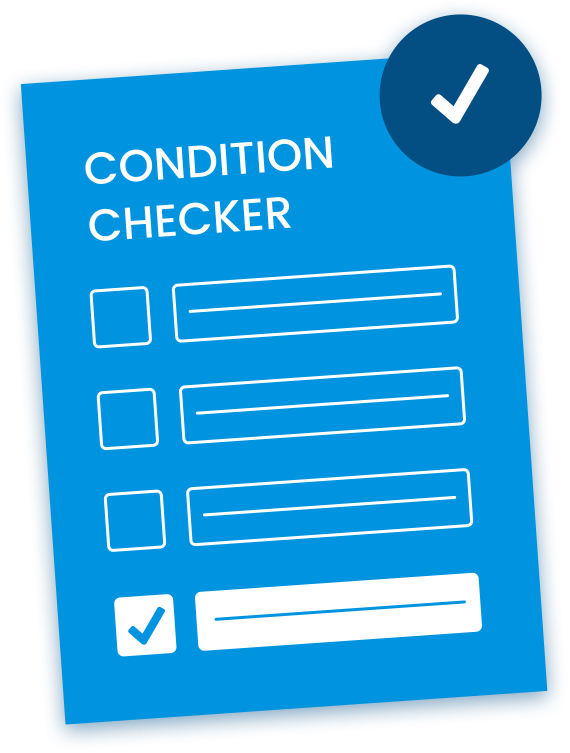Torn Meniscus
Find out which possible conditions you may be suffering from by trying our 2-min Guided Pain Assessment Form!





A torn meniscus occurs when the C-shaped cartilage that lines your knee sustains an injury or years of advanced wear and tear.
Doctors refer to this C-shaped cartilage as the meniscus; and, you have two menisci in each knee. Your medial meniscus begins in the middle, front side of your knee and wraps around to your inner leg. Your lateral meniscus, on the other hand, lines the other half of your anterior knee, arcing around to the outside of your leg.
Furthermore, both of these spongy, crescent-shaped tissues serve to cushion your knee. The largest joint in your body, your knee forms where your femur (aka thighbone) meets your tibia (or shinbone). Because your knee is in constant motion–as we walk, jog, or climb stairs–it suffers from a lot of wear and tear. The cartilage of the menisci, therefore, protects our bones from grinding against one another as we navigate our day-to-day lives.
In fact, the two main types of meniscal injuries include:
If either of these scenarios sounds like you, don’t hesitate to contact our orthopedic specialists at NJ Spine & Ortho! Our doctors specialize in both acute and degenerative cases of meniscal tears!
In general, the menisci do a terrific job of cushioning our knees from damage. Nevertheless, our knees are not invulnerable to injury. In fact, certain activities can increase our risk of developing a torn meniscus. Some of these activities include:
In addition, the type of movement that preceded the injury often determines the type of meniscal tear that will result. These injuries can go by many different names, but they serve to characterize the appearance of the tear. For example, bucket handle tears aptly resemble a bucket handle. These tears form when a tiny strip of cartilage rips away from the moon-shaped main body of the meniscus. As a result, the meniscus takes on a “D” shape, like a bucket handle.
Other common forms of meniscus tears include radial, flap, and parrot’s beak. To find out which type of meniscal tear you have–and to receive treatment for your torn meniscus–contact our team of knee surgeons at NJSO!

Find your condition with our 2-minute Condition Checker.
Did you know that when you walk, your knee absorbs 2 – 4 times your body’s weight? When you run, these numbers can jump all the way to 6 – 8 times. Because so much force is applied to your knee, the first symptom that you might notice with a torn meniscus is an audible pop. This occurs as the meniscus snaps, releasing pressure on the knee and gases, such as CO2.
Thereafter, painful symptoms may emerge immediately or up to 24 hours later, as swelling builds up around the knee. Common symptoms of a torn meniscus may include:

Discover which treatment options are right for you with our Treatment Finder.
If you have been diagnosed with a torn meniscus, then your doctor will begin with a regimen of conservative treatments. Many people find that rest, immobilization, ice, and pain medication are sufficient to jumpstart their healing process.
For those with slightly worse injuries, your doctor may prescribe a course of physical therapy. During PT sessions, your physical therapist will design strengthening exercises that help you build hamstring, quadriceps, and calf muscles, while preserving flexibility and fluid motion.
However, not all meniscal tears will heal adequately with either one of these interventions. When meniscal tears are particularly severe or do not heal within 6 months’ time, your doctor may recommend surgical treatment. Because the abundance of blood supply often determines healing time, you are more likely to need meniscus surgery if:
If you need meniscus surgery, then don’t fret. A vast array of minimally invasive surgical options exist from which you can choose!
There are 3 primary forms of surgery that your doctor may recommend to address your torn meniscus. These include:
If you need arthroscopic surgery, don’t hesitate to contact one of our minimally invasive surgical experts. Our doctors specialize in sports medicine and can help you achieve pain relief without the side effects of medication. For expert advice that you can trust, contact NJ Spine & Orthopedic today!

Determine your eligibility with our Candidacy Verification.
CONTACT
Phone: 855.586.2615
Current Clients: 855.706.1011
NJ Spine and Orthopedic is dedicated to delivering minimally invasive laser spine surgeries to eliminate the pain, discomfort, and dysfunction of numerous conditions of the neck and back.
OVERVIEW
LOCATIONS
Copyright © 2025 NJ Spine & Orthopedic